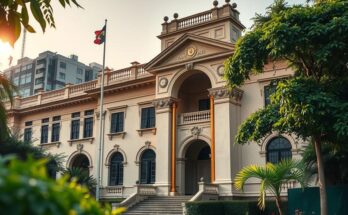Lebanon’s recent reforms aim to address its financial opacity, but confronting Hezbollah’s parallel state is essential for real progress. Recent legislative changes allowing deeper access to banking records aim to unlock aid but raise questions about whether they will extend to Hezbollah’s financial activities. The group’s illicit economy thrives without accountability, posing a significant obstacle to national recovery and sovereignty. Ensuring that all financial systems adhere to the rule of law is imperative for Lebanon’s rebuilding efforts.
Lebanon, once hailed as the “Switzerland of the Middle East,” is confronting the dire reality of institutional decay driven by corruption, foreign intervention, and civil discord. While recent reforms—like the elimination of banking secrecy—might signal potential progress, the true test for Lebanon lies in addressing the pervasive influence of Hezbollah and its parallel economy. Without confronting this powerful entity, the vision of genuine reform will remain elusive.
In late April, the Lebanese parliament approved a reform measure that grants regulatory bodies, including the central bank, expanded access to bank account data. This pivotal change is aimed at unlocking a long-awaited $3 billion financial package from the International Monetary Fund (IMF), allowing audits of accounts for up to ten years. On the face of it, this should help enhance financial transparency and restore some level of international confidence.
However, the context is much murkier. The banking crisis that spiraled out of control in 2019 revealed a series of systemic failures—banks froze depositors’ assets, rolled out a divisive “fresh dollars” scheme, and acted without proper accountability. Out of this chaos, Hezbollah thrived, capitalizing on the erosion of formal institutions while operating largely beyond the reach of regulatory oversight.
One pressing question looms: will the newly broadened auditing authority extend its reach to Hezbollah’s complex financial operations? The group has a well-established, opaque financial network that operates extralegally; whether this will be subject to any real investigation remains uncertain. Political stalemate and fear of retaliation may allow Hezbollah’s financial empire to persist unchallenged.
The implications of Hezbollah’s financial activities cannot be understated. They are deeply intertwined with the broader crisis in Lebanon. The group has crafted a parallel economy, replete with its own banking structures and social services, shielded from central regulation. The Al-Qard Al-Hasan Association, largely perceived as a benevolent organization, is actually a cornerstone of its financial frameworks, offering loans without government oversight despite sanctions imposed by the United States.
Hezbollah’s operations extend far beyond Lebanese borders, engaging in various illicit activities like drug trafficking and money laundering—an expansive network that has generated significant revenue. These criminal endeavors pour funds into Hezbollah coffers, facilitated through cash couriers and informal financial networks that effectively evade governmental control.
Significantly, Hezbollah continues to enjoy substantial backing from Iran, which enables it to maintain an informal market within Lebanon. Through ventures like real estate and pharmaceuticals, it has been able to dominate certain sectors, simultaneously undermining legitimate Lebanese enterprises and cementing its control over the local economy and populace.
For Lebanon’s leadership to genuinely pursue reforms, it must confront Hezbollah’s influence. Any regulatory adjustments that do not address the group’s shadow economy could be construed as superficial. For any reform to resonate and yield real change, all entities operating within Lebanon’s economic sphere must be held accountable, under the law without exception.
Yet, optimism is fleeting. Hezbollah’s entrenched position is a remnant of historical settlements post-civil war, and several governments have either tolerated or even fostered its expansion, fearing potential civil unrest. Even now, suggestions to disarm the group or rein in its powers are often dismissed as impractical or too perilous.
Nevertheless, inaction brings immense costs. With Lebanon teetering on the brink of total economic disaster, the persistence of Hezbollah’s unregulated financial system damages legitimate institutions, fosters corruption, and ensures no meaningful recovery can occur, effectively placing the most influential economic player outside of reform’s reach.
Additionally, Hezbollah’s extensive social services—ranging from healthcare to education—function independently of state regulation. This dynamic not only provides vital resources to communities marginalized by the government but also serves as a mechanism for political loyalty among the populace. Incorporating these services into the national framework is essential for Lebanon to rebuild a cohesive identity.
Indeed, this challenge is monumental, with potential flashpoints in confronting such a heavily armed entity. Supporters of Hezbollah argue that its presence is crucial for national security amid external threats, particularly from Israel. Yet the true menace to Lebanon’s stability is internal, manifested in state fragmentation, systemic lawlessness, and compromised sovereignty.
The current leadership, while taking steps toward reform, faces immense hurdles. Sovereignty cannot be selective; one cannot claim banking reforms while overlooking a militia’s unregulated financial operations. The expectation of international aid, too, does not harmonize well with the tolerance of illicit networks.
Reform must stem from a national initiative, rather than solely being a result of external pressure. Lebanese officials must find the resolve to act, propelled not merely by IMF demands but by the imperative to ensure Lebanon’s survival. Only by enforcing the rule of law across the board can the nation hope to reclaim its future.
The path forward is complex. Resistance from entrenched interests, fear, and institutional inertia will pose major obstacles to reform. However, each step toward reinstating state authority over the economy, armed groups, and informal markets is essential to salvaging a nation that has long been on the brink.
If Lebanon does not act decisively now, it risks losing what remains of its sovereignty, further entrenching itself into chaos. The time has come for Hezbollah’s unchallenged status to be dismantled. Only then can Lebanon embark on a true path to recovery.
In conclusion, Lebanon stands at a critical juncture where effective reforms depend on confronting Hezbollah’s financial empire. The nation’s past successes cannot justify the continuation of a parallel economy that undermines formal institutions. Without substantial action against this group’s influence, genuine reform will remain unattainable, and Lebanon’s prospects for recovery appear bleak. A commitment to sovereignty and the application of the law to all entities, including Hezbollah, is essential for Lebanon’s future stability and success.
Original Source: weeklyblitz.net




